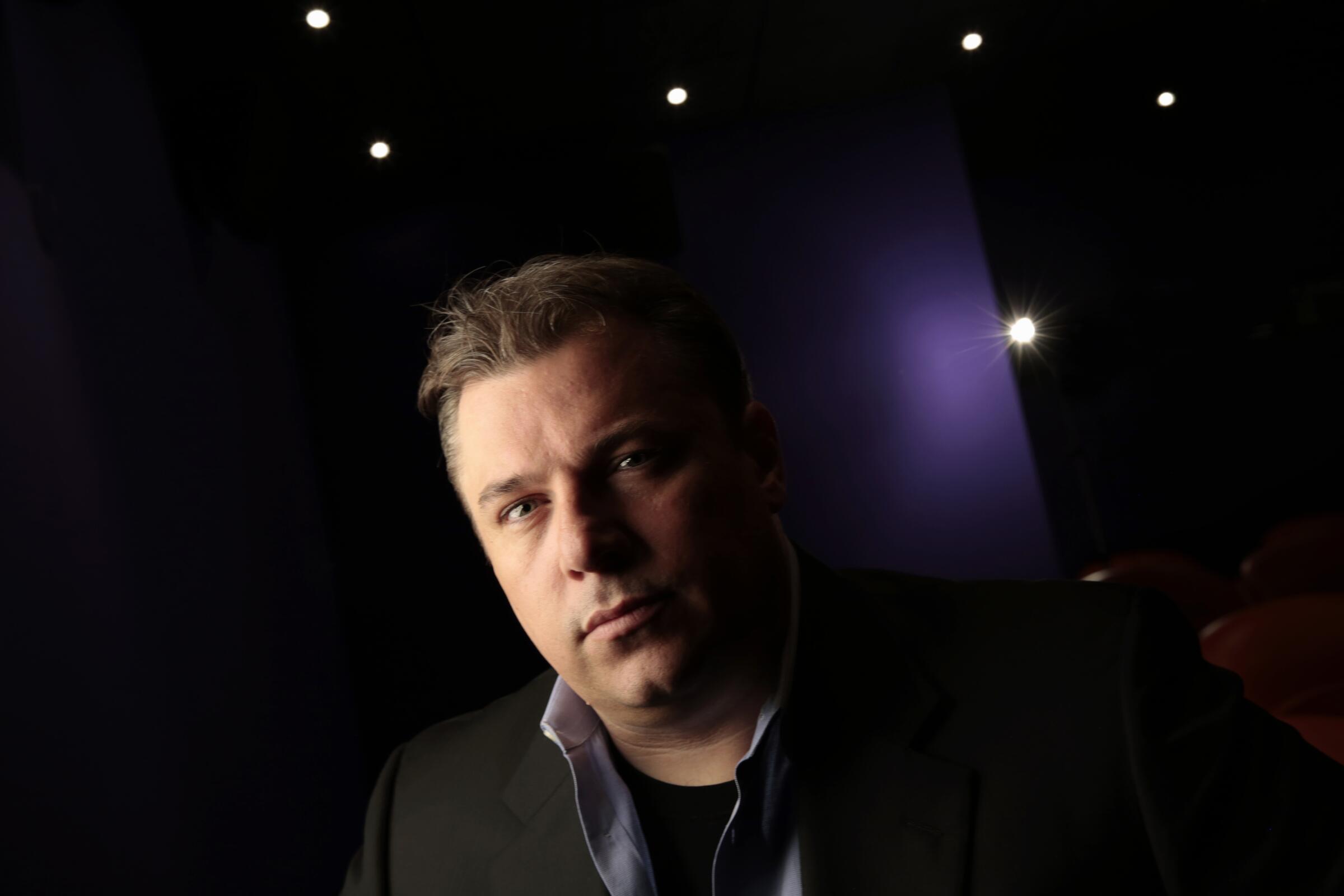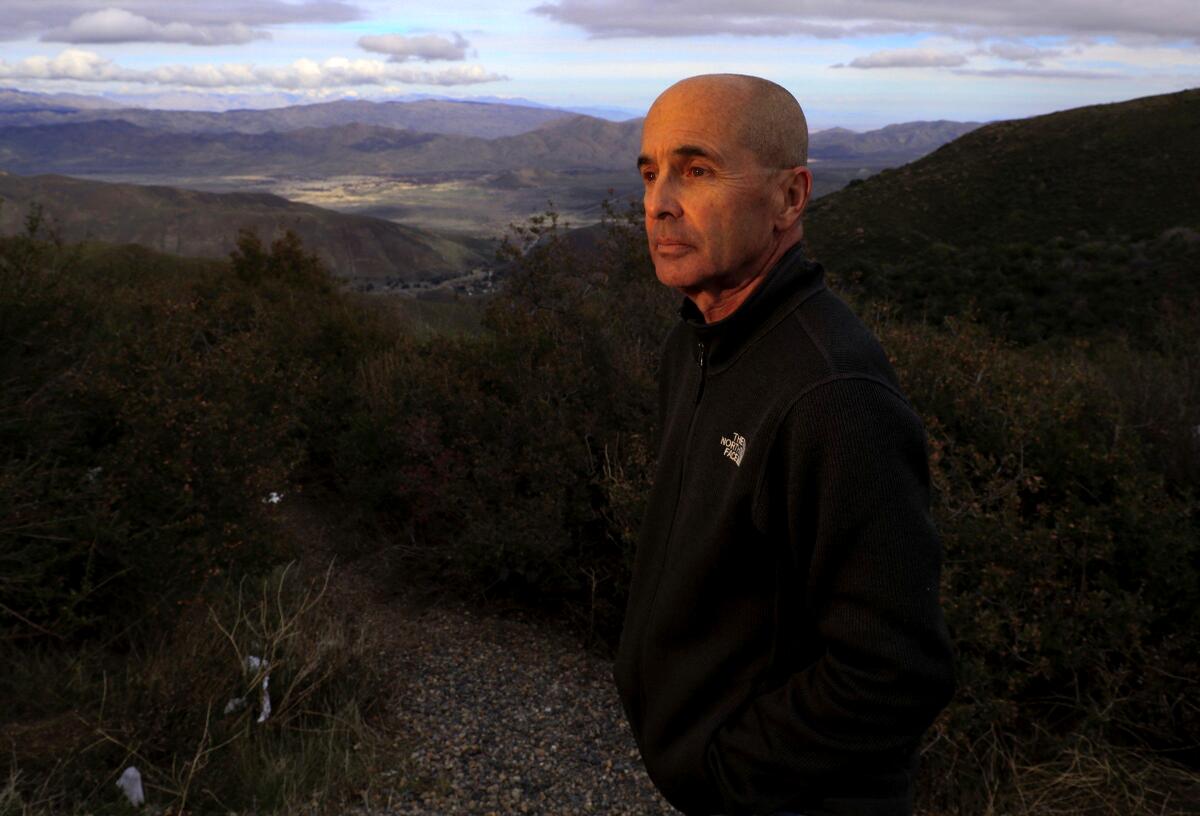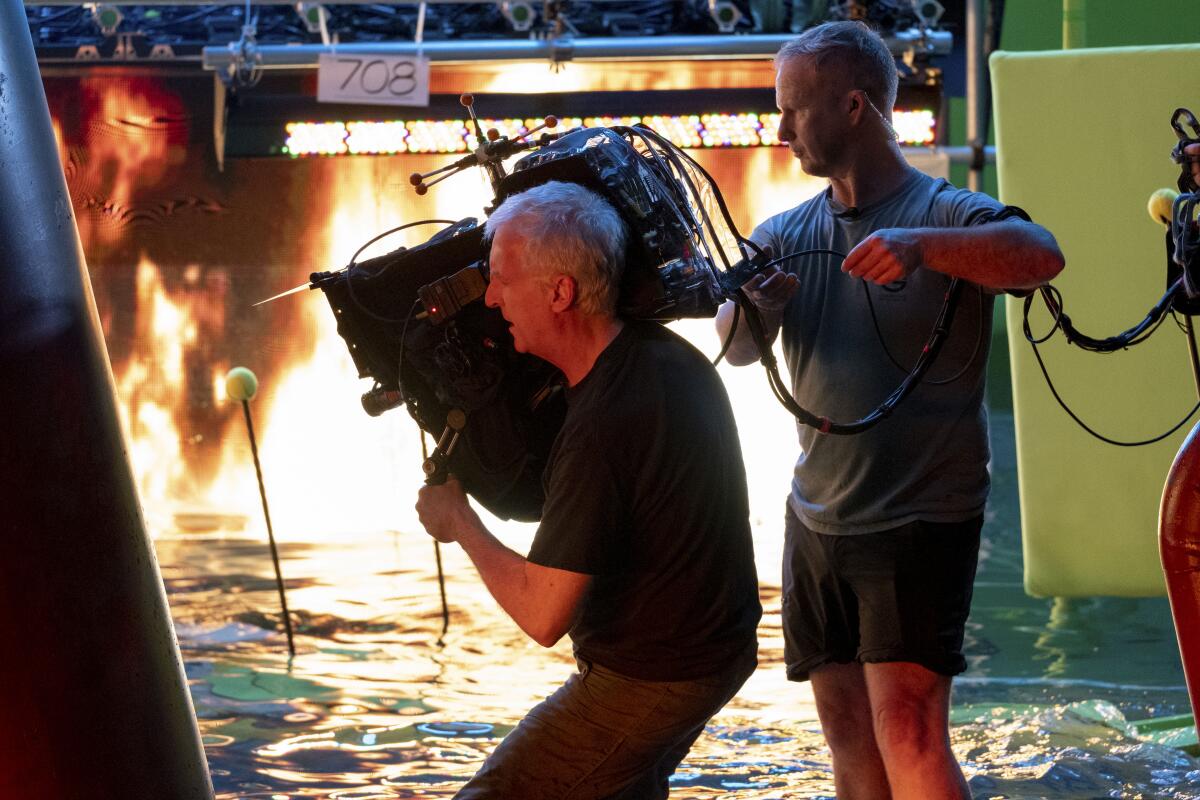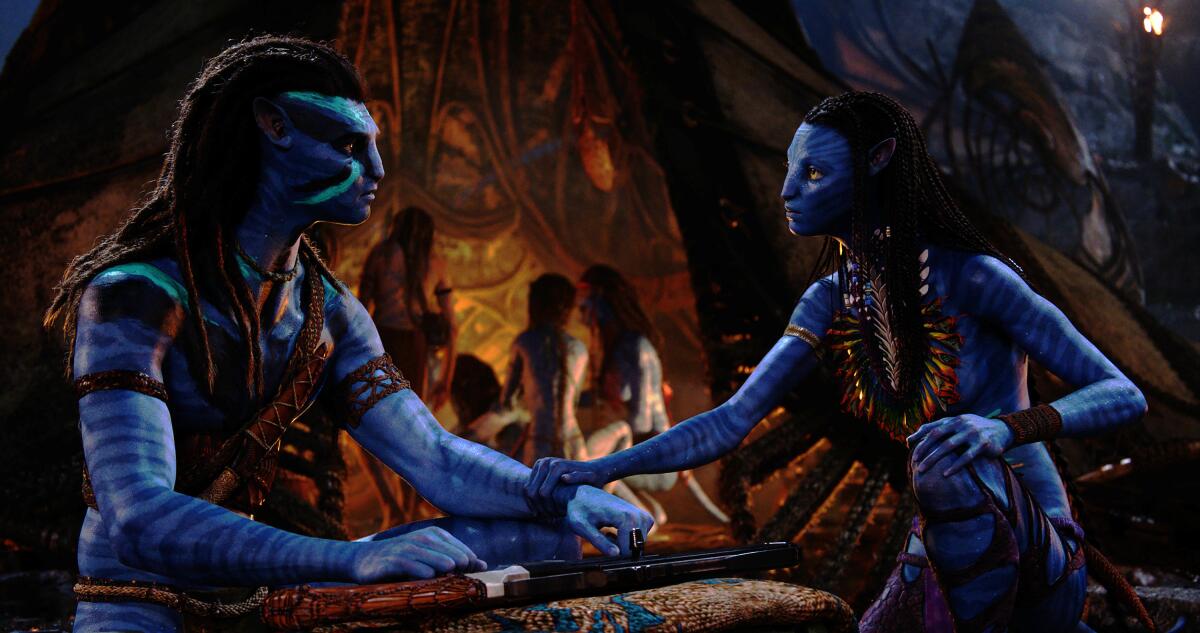Sign up for our Book Club newsletter
Get the latest news, events and more from the Los Angeles Times Book Club, and help us get L.A. reading and talking.
You may occasionally receive promotional content from the Los Angeles Times.

When the film series you worked on for years has broken all manner of box office records with its first installment, which is nominated for the best picture Oscar, you would be forgiven for wanting to talk about nothing else. Especially in the weeks running up to the Oscars.
Shane Salerno, who has story credit on “Avatar: The Way of Water” and helped develop the subsequent three films in James Cameron’s saga (he will have screenplay credit on the fourth), is happy to describe the thrill of getting the job (“We had to submit four separate screenplays”) and being part of one of Hollywood’s most secretive franchises (“It was a locked room, no one was allowed in it besides us, we all had key cards because there were whiteboard walls with a billion dollars’ worth of ideas”).
But he is just as eager to discuss the success of the authors he reps through his homegrown agency the Story Factory, including but not limited to: the bestselling “Heat 2” by clients Michael Mann and Meg Gardiner; the recent announcement that James Patterson will finish Michael Crichton’s last book (Salerno reps Crichton’s publishing estate); and the upcoming FX series based on Don Winslow’s “Cartel” trilogy (Winslow was Story Factory’s first client; Salerno is co-creator and executive producer of the series).
“The material is so large,” says Michael Mann, that it never left him. His classic L.A. movie finally has a sequel, of sorts, in the novel “Heat 2.”
He is also a producer on “The Chain,” adapted from the novel by Adrian McKinty, a longtime Irish author Salerno helped catapult to fortune and fame, and on “Falling,” based on the bestseller by first-time novelist T.J. Newman, whom Salerno took on after her manuscript had been rejected 42 times.
It’s a lot, even by James Cameron/“Avatar” standards.
There has always been a relentless “and wait, there’s more” quality to Salerno’s career, which began when he made a documentary short as a high school student in the San Diego area. After “Sundown: The Future of Children and Drugs” premiered on “Larry King Live” in 1991, Salerno called on the national media to show the names and faces of missing children. “Milk cartons are not nearly as powerful a medium as a newspaper or television news broadcast,” he told The Times at the time.

A few years and a move to Los Angeles later, Salerno was developing projects for Steven Spielberg and Sylvester Stallone; his first writing credit, at 24, was on “Armageddon,” the highest-grossing film of 1998. By 28, he was an official Hollywood wunderkind, co-creating and executive producing “UC: Undercover.” That’s where he met Winslow, the author who would later spark the creation of the Story Factory. (In 2021, Salerno and Winslow began making a series of political videos that briefly tore through social media.)
Salerno tends to swing big, sell hard and announce his deals with the zest of a “kid, I’ll make you a star” Hollywood agent. His highly promoted documentary “Salinger” debuted with an accompanying coffee-table book, and when critics took issue with the film, Salerno responded directly with an essay in Esquire. And though he is no longer the industry’s Boy Wonder, Salerno has worked with some of the biggest names in film, including Cameron.
A series of wildly popular anti-Trump videos are the latest milestone in Shane Salerno and Don Winslow’s unlikely but highly influential friendship.
In late 2012, “I heard rumblings that they were maybe looking for writers on ‘Avatar,’” he recalled. “I had just finished working with James Cameron and Jon Landau on a remake of ‘Fantastic Voyage’ that had come very close to being made.”
Landau called Salerno to see if he was available; soon Salerno was meeting with Cameron.
“I remember saying to Jim that I had some concerns about making a sequel to the highest-grossing movie of all time. Because I had loved ‘The Matrix’ and … there are examples of twos and threes working but a lot more of them not. I said, ‘You are going to have to do more than have people running around the woods again.’ And he got this big grin on his face and I knew I wasn’t telling him anything he hadn’t thought of himself.”

When Landau offered him the job, Salerno says, he screamed. He thought he had hit the mute button on his phone but alas, he had not. “After I screamed I heard Jon say, ‘Shane, I’m still here.’ Very embarrassing.”
In early 2013, the work began. “Jim said, ‘Come down, we’ll all be in a room and break these three movies together.’”
But when the creators gathered, Cameron’s first directive was not about where the story would go but where it began. “We thought we’d come in and start pitching ideas. Jim said, ‘We’re going to do an autopsy on “Avatar” to figure out why it was so successful.’”
T.J. Newman wrote “Falling,” a thriller set aboard a flight, during red-eyes while working as a flight attendant. Then came the book and movie deals.
The group — Cameron, Salerno, Rick Jaffa, Amanda Silver and Josh Friedman — spent two weeks rewatching the first film and breaking it down scene by scene, presenting reasons why they thought it worked.
Then the pitching began and, Salerno says, “Jim became Jim Cameron, the writer. You were able to say, ‘That’s a bad idea and here’s why.’”
Cameron was clearly more than a writer when he came in one day and announced that the three films they thought they were working on would have to be four. “I said, ‘Don’t you have to check with someone on that?’” Salerno says. “And he looked at me and said, ‘No.’”
Each writer in the room focused on — and will get screenwriter credit for — one of the four films (Jaffa and Silver are a team). But Salerno says it was a group effort because it had to be. “Jim knew where the story was going but it is a saga, and when three movies became four, well, there was some rearranging that had to be done.”

Even as he helped chart the course of the Na’vi, Salerno was addressing another besieged group. A conversation with a discouraged Winslow convinced Salerno that someone needed to do a better job representing authors — and that someone was him. He shook the dust off of Winslow’s respected but under-celebrated career and helped send “The Cartel” up the bestsellers list and into the Hollywood mix.
The bestselling crime novelist plans a virtual book tour for his new title, “Broken,” as the coronavirus keeps him home in Southern California.
Winslow began recommending Story Factory to his fellow writers, including McKinty. Salerno brokered a deal in which Paramount paid seven figures for “The Chain,” which hadn’t even been written yet.
“It broke my heart not to see them being successful,” Salerno said via email. “After writing 15 great books, why should Don Winslow be thinking about quitting the business entirely and going back to being a safari guide in Africa? After writing 17 great books, why should Adrian McKinty be out driving an Uber at night just to keep a roof over his family’s heads? If ever there was a business model that needed a fundamental change, this was it.”
After the “Avatar” films were completed, Salerno took a few years off to focus on building up the Story Factory’s authors list. He is happy to report that the firm has put 25 books on the New York Times Best Sellers list and made 20 seven-figure deals for film and television.
“My last vacation was more than 15 years ago,” he says. “But imagine having ‘Avatar’ and the Crichton/Patterson deal come out at almost the same time? I remember hearing once, ‘Find what you love and find what you’re good at and if God is smiling they’re both the same thing.’ I’ve been blessed to do what I love.”
Which, in Salerno’s case, is everything everywhere all at once.
Sign up for our Book Club newsletter
Get the latest news, events and more from the Los Angeles Times Book Club, and help us get L.A. reading and talking.
You may occasionally receive promotional content from the Los Angeles Times.